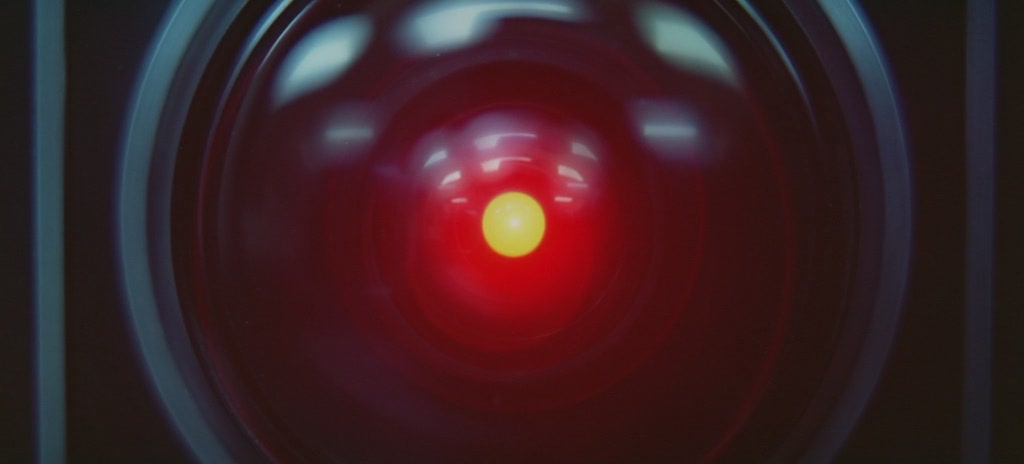老外在中国:我最爱的语音助手
中国日报网 2018-11-02 16:53

Way back in 1968, the Stanley Kubrick film “2001: A Space Odyssey” featured a main character that was a forerunner, in a sense, of today's digital assistants.
从某种意义来说,早在1968年,斯坦利•库布里克的电影《2001太空漫游》中的主角之一就是当代数字助手的前身。
The HAL 9000, a supercomputer endowed with artificial intelligence, ran a space ship and interacted with astronauts using a soft, calm voice and an unblinking red lens for an eye. HAL -- short for heuristically programmed algorithmic computer – was the creation of novelist Arthur C. Clarke.
小说家亚瑟•C•克拉克创作的哈尔9000(HAL是启发式编程算法计算机的缩写)是一台超级计算机,它配备人工智能技术,驾驶一艘太空飞船,用温柔平静的声音和像一只一眨也不眨的眼睛一样的红色镜头与宇航员交流。

Today's digital assistants, of course, can be customized with a variety of voices and taught to turn things on or off in the home or play a favorite song.
当然,如今的数字助手可以定制不同声音,学习开关家里的设备,或者播放人们喜欢的歌曲。
According to a report on the website DigitalMarket.Asia, China’s consumers are leading the way in using voice assistants
据亚洲数字市场网报道,在使用语音助手方面,中国消费者处于领先地位。
Citing the study Speak Easy, jointly created by the J. Walter Thompson Innovation Group and Mindshare Futures, the report said the use of voice controls by Chinese for most activities was higher than the global average, “reflecting the strong appetite for voice technology in China”.
该报告援引汤普森创新集团和Mindshare Futures联合进行的研究“Speak Easy”称,在大多数活动中,中国人使用语音控制的次数高于全球平均水平,“这反映出中国对语音技术的强大热情”。
It said that finding out product information and searching online had the highest usage, “which is driven by the busy and fast-paced lifestyles of Chinese consumers.”
该报告提到,在查找产品信息和在线搜索时使用语音助手的频率最高,“这是因为中国消费者处于繁忙快节奏的生活方式中。”
But considering that my high-tech life doesn’t go much beyond a smart phone and an e-reader, I was amazed at a recent New York Times report describing what voice products from companies like Amazon and Google can do.
但由于我生活中的高科技基本仅限于智能手机和电子阅读器,所以当我看到《纽约时报》最近一篇报道介绍了亚马逊、谷歌等公司的语音产品功能后,我感到非常惊讶。
You can have these devices read you the day’s top news. You can add to your shopping list, and by downloading an app, it will remind you of what you need when you’re close to the store.
这些产品可以为你朗读当天的头条新闻。你可以下载一个应用程序并添加购物清单,当你走到商店附近时,它便会提醒你购买所需的物品。
More and more people have multiple devices, and it’s no wonder: You can use them like a linked intercom to call the kids to supper.
越来越多的人拥有多个产品,你可以把它们当对讲机,招呼孩子们吃晚饭,这也不足为奇。
Feel like relaxing? They can walk you through a guided meditation. If you want to hear an uplifting story, say “tell me something good”. If you want to have a natural conversation, set the device so that you don’t have to start every sentence with your digital assistant’s name.
想放松一下吗?这些产品可以指导你进行冥想;如果你想听一个开心的故事,只用对它们说一句“给我讲点高兴的事儿”;如果你想随便聊聊天,你可以进行设置,这样你就不必每讲一句话前都要叫一声你的数字助手的名字。
OK, admittedly, all this sounds pretty cool. The Speak Easy report even found that 43 percent of smartphone users “think voice technology will free us up from our dependency on the mobile to allow us to interact more with the world around us”.
是的,无可否认,所有这些听起来都棒极了。Speak Easy报告甚至发现,43%的智能手机用户“认为语音技术将使我们摆脱对手机的依赖,让我们有更多机会与周围的世界进行互动”。
That is, people won’t have their noses glued to their phones as much, at least theoretically.
也就是说,至少在理论上,人们不会一直盯着手机屏幕了。
But I submit that there is another side to all this. For one, there is the risk of falling in love with a disembodied voice.
但我认为事情还有另外一面。比如,你可能会爱上一个虚拟的声音。
“Almost half (43 percent) of regular voice technology users globally say that they love their voice assistant so much that they wish it were a real person,” DigitalMarket.Asia reported, citing the study. “This is particularly true in the markets enthusiastically embracing voice, such as China (65 percent) and Thailand (61 percent).”
亚洲数字市场网援引Speak Easy报告称:“全球近一半(43%)经常使用语音助手的用户表示,他们非常喜欢语音助手,甚至希望它是一个真人。在语音助手大受欢迎的市场,比如中国(65%)和泰国(61%),这种情况尤其明显。”
Another trend from the study’s summary is that consumers express the desire to give up control to their intangible companion. “Voice assistants will start to take on a more prominent role, managing consumers’ lives proactively, making decisions independently, and (they) will essentially evolve into ‘digital butlers’.”
该研究总结的另一个趋势是,消费者表示愿意放弃对虚拟语音助手的控制。“语音助手将扮演更重要的角色,主动管理消费者的生活,独立做出决定,它们将从本质上转变为‘数字管家’。”
That reminds me of how things went with the HAL.
这让我想起了哈尔的故事。

In the film, when astronauts David Bowman and Frank Poole whisper to each other that they may disconnect HAL because it (or is it “he”?) appears to be malfunctioning, HAL reads their lips and decides to disconnect them.
在电影《2001太空漫游》中,当宇航员大卫•鲍曼和弗兰克•普尔小声说,他们可能会切断哈尔的连接,因为它(或者是“他”?)似乎出现了故障,哈尔读懂了他们的唇语,并决定对他们下手。
At one point, HAL has locked Bowman in a pod and is threatening to cut off his air supply. Bowman demands he open the door.
在某一刻,哈尔把鲍曼锁在一个太空舱里,并威胁要切断他的空气供应。鲍曼命令他把门打开。
That’s when HAL, in his calm, polite voice, produces one of the creepiest expressions ever heard in a science fiction film: “I'm sorry, Dave. I'm afraid I can't do that.”
就在这时,哈尔平静有礼地说了句:“对不起,大卫。恐怕我做不到。”这是科幻电影中最恐怖的台词之一了。
编审:董静 丹妮
音频编辑:焦洁
来源:CHINA DAILY 微信公众号:

About the author & broadcaster
Matt Prichard is a copy editor and writer who works on the front page team of China Daily. He has lived in China for more than four years, in Shanghai and Beijing. Before that, he had a 30-year career as a reporter and editor in the United States and Latin America. He has an ABJ from the University of Georgia and did postgraduate work at the Universidad Nacional del Sur in Argentina. He speaks Spanish fluently and is still learning Mandarin.
Contact the writer at mattprichard@chinadaily.com.cn

















 英语点津微信
英语点津微信 双语小程序
双语小程序